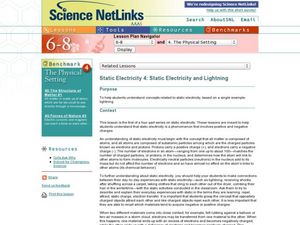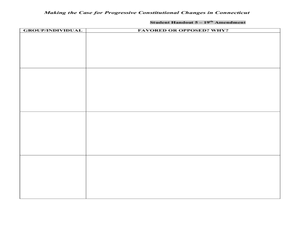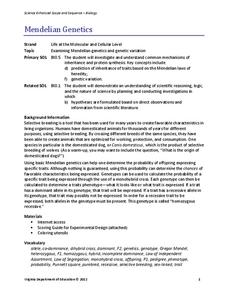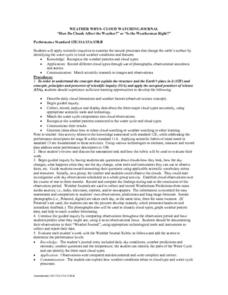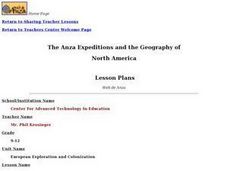Curated OER
Hatching Chickens
Students learn the importance of caring for eggs as they hatch chickens. In this egg hatching lesson, students observe what happens when eggs are hatched into chickens by completing a e-worksheet and watching a web based movie.
Curated OER
Amazing Water Changes
Students explore the properties of water and how it changes states. In this kindergarten to 2nd grade science lesson, students pair a hands-on science activity with two suggested books. This inquiry lesson has extension activities to...
Curated OER
Making the Case for Progressive Constitutional Changes in Connecticut
Students take a closer look at Constitutional Amendments. In this Progressive Era lesson, students discover how the amendment process works and then examine 4 amendments proposed during the era in Connecticut. Students research primary...
Curated OER
Curious About Creepy Crawlies?
Students create oral presentations and visual aids to assist their inquiry about various insects. They reflect on the importance of learning about insects while working in small groups.
Civil War
Civil War Medicine: Fact or Fiction
Young historians compare the presentation of medical care during the Civil War in passages from fictional and nonfictional texts. They examine passages from Gone with the Wind by Margaret Mitchell and Soldier's Heart by Gary Paulsen, and...
Curated OER
The Effects of Ultra-Violet Light on Yeast
Students work in small groups collecting and analyzing data as they learn how to best grow yeast. This lesson allows students to conduct several student-created experiments as they continually generate questions and hypotheses. ...
Curated OER
Pieces of an Artifact
Students review what an artifact is and discover what happens when only pieces of the artifact are found. In groups, they are given a picture of a small piece of an artifact found and they are to make the entire drawing of the artifact...
Curated OER
Mendelian Genetics
Learners work collaboratively in small learning groups to create some representation of an aspect of Mendelian genetics in this review lesson for the Biology classroom. The lesson includes task cards for each small group and a...
Curated OER
Right to Remain Silent(?)
Learners consider the rights of journalists regarding source confidentiality, then create presentations on the New York Times' use of sources. They write guidelines to aid journalists in evaluating the trustworthiness of their sources.
Curated OER
An Introduction to the Night Sky and Movement Astronomy
Basically, this is an interactive exploration of educational astronomy software and an app. Young astronomers discover how the apparent motion of the sky relates to Earth's movements and the position of the observer. It is out of this...
National Library of Medicine
Your Environment, Your Health: Food Safety
Did youknow that chicken causes the greatest risk of food-borne illness. The fourth unit in a six-part series addresses food safety. Scholars research common scenarios of food causing illness through the National Institute for Health....
Curated OER
"Croak" Science Mystery
Solve the mystery of a declining frog population! Lead your junior ecologists on an investigation that simulates actual events concerning pollution, predation, poaching, and more. Investigators read a story online, then analyze survey...
Curated OER
The foreign and domestic policies of Lyndon B. Johnson
Eleventh graders study and evaluate the successes and failures of LBJ's domestic and foreign policies. They formulate historical questions and defend findings based on inquiry and interpretation. Each student identifies, analyzes and...
Curated OER
Weather Whys- Cloud Watching Journal
Learners examine how natural processes change the earth by identifying their local water cycle. Individual students complete a cloud journal over a specific period of time. They observe clouds daily and take photographs of the clouds...
Curated OER
Collecting My School Family Data
Pupils are tasked with collecting data on their school. In groups, they collect data on various aspects of school life along with social and economic backgrounds and charactertics of their hair and eye color. They draw two pictures,...
Curated OER
I Have the Solution!
Students explain how to make solutions with specific concentration. In this chemistry lesson, students differentiate acids and bases. They calculate molarity of solutions.
Curated OER
Water Density Boundaries
Students create observable layers in water that represent a separation based upon density differences. They model density boundaries using differences in temperature and salinity. They, in groups, perform a meaningful experiment...
Curated OER
Who Wants to be a Cellular Biologist?
Eighth graders review concepts in cellular biology. In this biology lesson, 8th graders play an interactive game based on the idea of winning money. They discuss misconceptions about the topic.
Curated OER
Plants Under Attack
Third graders will identify the four needs for plant survival and gain skills and confidence in using scientific measurement tools, probes as well as the spreadsheets and graphing capacity of a computer to represent and analyze data.They...
Curated OER
Spanish Colonization: The Anza Expedition
Learners research the Spanish explorations and North American geography. They create web pages based on their study.
Curated OER
The Mysteries of Saturn and Cassini
Students examine photographs of Saturn and make observations. They develop questions they have based on viewing the photos. They work together to answer their questions.
Curated OER
Don’t be a Stoic about Stoichiometry
Students review balancing chemical equations. In this chemistry lesson, students calculate moles of an unknown substance based on stoichiometric relationships in the balanced equation. They cite applications of stoichiometry in the real...
Curated OER
Land Use in New Hampshire: Farming
Pupils examine how the environment as affected people farming in New Hampshire. They visit a field trip to a local farm to make observations. They create a poem based on their observations.
Curated OER
Electrical Engineers for a Day
High schoolers build a robot out of a 3-¿¿ inch floppy disk drive, two floppy disks, and some other miscellaneous supplies. They apply information they gather about electrical circuits from a web-based circuit design program.
Other popular searches
- Inquiry Based Learning Maths
- Inquiry Based Learning Plant
- Inquiry Based Learning Science
- Inquiry Based Learning Space
- Math Inquiry Based Learning



